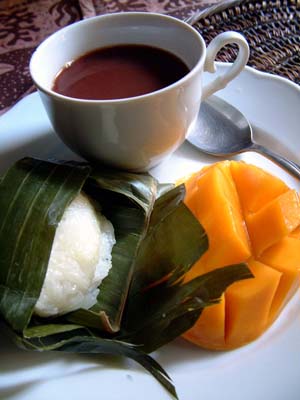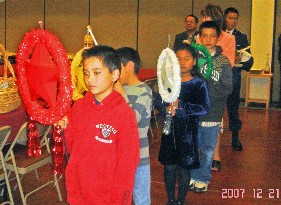Misa de Gallo
December 25, 2007
by Teresa Martinez Sepulveda
It was my brother's birthday and our niece had invited us over to her house to celebrate. Dinner was to be served at 7pm. I planned to work on packing some merchandise till 6pm and be on my way to dinner at 6:30. My brother suggested passing by our church for a visita iglesia on his special day. I advised him to go ahead to church and get back to me, as I had to finish packing up my wares. Quarter to 7pm came and I looked around to see my brother still waiting me to finish. He advised to wait to leave together and save on gas. It was raining hard that evening and I was concerned that my niece will be waiting in vain. Upon getting to church, I decided to stay in the car with my 3 year old toddler and wait for my brother lest we get sick in the pouring rain. We were wondering _why were there a lot of cars parked by the church on a Tuesday night. I decide to join my brother as the lighted church beckoned me to come in. Lo and behold!!the church was filled and in the middle aisle was a procession of young children parading different colored, parols. (Filipino lantern) It was the parish church evening for a Misa de Gallo.
The handout passed around explained:
Simbang Gabi, also known as Misa de Gallo, is a uniquely Filipino Catholic practice during the season of Advent that Filipino immigrants have brought to America. Simba means Mass and Gabi means night or evening. It is a Mass held at the break of the dawn, which is characterized in the Philippine setting with the crowing of the rooster, (or gallo in Spanish.)
It was in or about 1660 during the early years of Christianity in the Philippines that the Simbang Gabi became a religious tradition. In preparation for the birth of Jesus, the missionary fathers held nine days of Masses celebrated in the early morning hours, typically about 4:00 am. There were practical reasons why the missionary fathers held the Masses early in the morning. The Filipinos were mainly farmers who typically greeted the dawn of a new day in the fields while working the land. At the first sound of dawn, namely the crowning of the rooster, the entire family would get up and walk to the nearest parish church to attend the Simbang Gabi. By 5:00 am the mass was over and the men were off to the fields.
Filipino immigrants brought this tradition with them when they came to the United States. However, since it is not practical to hold a celebration at dawn due to the cold December weather, local parishes hold the celebration at night typically at 7:00 pm when most are done with their work. While the form of celebration has changed, the substance remains the same, namely, a season of hope and joyous expectation. Some parishes hold all nine masses of Simbang Gabi in one church. In others, a chain of masses is held for 9 consecutive nights, one in each assigned church or parish where a significant Filipino community worships. Tonight, on our tenth year of Simbang Gabi at San Antonio Church in Anaheim Hills, we ask you to join us and Filipinos all over the world in the observance of this religious tradition.
We stayed on to hear mass. I put my cellular phone on silent mode. My niece incessantly called and the phone kept vibrating. I let it go. She'll understand when we tell her how wonderful it was to celebrate a joyous Misa de Gallo on a cold and rainy winter night in America.
Sikwate Talk - “Over a cup of sikwate”
Sit, relax, and enjoy what life’s got to offer. Like a cup of “sikwate”, it’s dark, raw, pure, and sweetened to taste. That’s how the journey is. Like falling leaves, it’s family re-tracing its roots and going back to the basics. This section will feature what life’s got to offer OVER A CUP OF “SIKWATE”. Look forward to more articles. It’s the “sikwate” talk.

